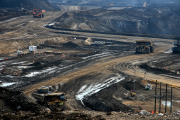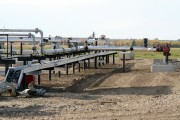As Stephen Harper’s natural resources minister, Joe Oliver already spends a lot of time going to bat for Canada’s oil and gas industry.
But at a meeting of Canadian energy ministers in Yellowknife last month, Minister Oliver took his support to another level. There, he made an eloquent pitch that developing our resources is a new kind of nation-building and an opportunity we are obliged to seize.
We have reached a “pivotal moment” in our history, he said, one where “the easy assumptions of the past are giving way to new realities.”
I think he’s entirely right about that — but not at all in the way he meant it.
Indeed, if you need an illustration of “the easy assumptions of the past,” look no further than the rest of Minister Oliver’s speech. It assumes that oil and other resources should be developed as fast as possible, leading to “enormous benefits.” And it assumes that climate change really isn’t part of the conversation: his speech didn’t mention those words once.
On the other hand, if you want a clear example of “new realities,” turn to President Obama’s test for the Keystone XL pipeline proposal. In a landmark climate speech in June, the U.S. leader said that Keystone is only in the U.S. national interest if the pipeline won’t make global warming worse.
It’s common sense that Keystone — a pipeline that would connect oilsands operations with refineries suited to process their crude, and to world oil markets — creates very favourable conditions for oilsands growth.
Our analysis of Keystone’s potential climate impact found that it could enable a 36 per cent increase from today’s oilsands production level, generating greenhouse gas pollution equivalent to adding over 4 million new cars to the road.
But not everyone sees it that way. Back in March, the U.S. State Department’s draft environmental assessment found that Keystone “remains unlikely to significantly impact the rate of extraction in the oil sands.” In other words, the economics of oil are so compelling that the oilsands will find its way to profitable markets one way or another, whether it’s by rail or on other pipelines.
That logic may feel familiar if you’ve ever contemplated a plate of Christmas cookies and said to yourself “I’m guaranteed to gain weight over the holidays anyway, so I might as well eat some shortbread right now.”
While the U.S. Environmental Protection Agency and other experts have pointed to weaknesses in State’s reasoning, Stephen Harper’s government has embraced it. In the wake of President Obama’s climate test for Keystone, Minister Oliver has pointed to State’s assessment again and again to answer questions about whether the project would increase greenhouse gas pollution.
That’s why we were so interested to read a very different perspective in confidential documents we received from Joe Oliver’s department via an access to information request. In a briefing prepared for an event in March, officials at Natural Resources Canada wrote, “in order for crude oil production to grow, the North American pipeline must be expanded through initiatives, such as the Keystone XL Pipeline project.”
We agree. But that conclusion disappeared from briefing notes prepared for Minister Oliver a few weeks later. By April, officials at Natural Resources Canada instead cited the State Department’s finding that Keystone would not affect the rate of oilsands production.
It’s a big shift on the issue at the heart of the debate.
Keystone observers are now anxiously waiting to see what State’s final assessment will say about the project’s climate impact.
The department has received over a million public comments on its draft findings, which it must factor into its ultimate assessment. And we’ve seen some big changes on the ground since the draft was published in March. For example, the odds of the Northern Gateway pipeline being built have diminished thanks to the B.C. government’s opposition to the current proposal, while the tragedy in Lac Mégantic has raised new questions about the safety of transporting oil by rail.
So Joe Oliver was right: we are at “a time of great consequence,” when “critical decisions must be made.”
And in that new reality — where climate change must be a central part of our decisions about energy and infrastructure — relying on outdated assumptions has consequences for all of us.
This article was originally published in the Toronto Star on 5 September 2013 and is available on the Star's website.





